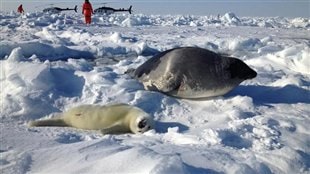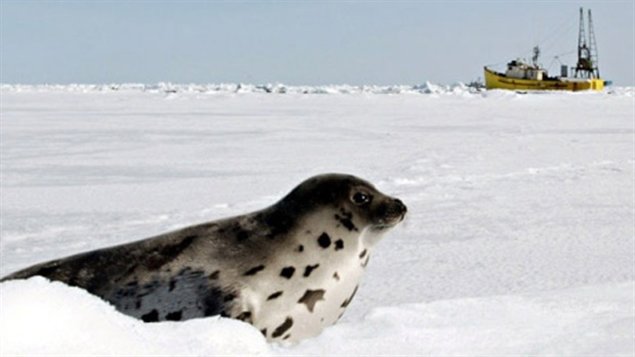A much smaller number of hunters is out on the ice fields of the east coast this week for the annual seal hunt.
Most hunting takes place off the north-east coast of the Atlantic province of Newfoundland involving herds of harp seals.
As of Sunday, only 15 boats had signed up for the hunt according to Rebecca Aldworth, executive director of the Canadian division of the Humane Society International (HSI Canada). She says the small number of hunters is due to closed markets for seal products in the US, most of Europe and Russia.
A federal government website says that in 2013, there were over 13,000 commercial licences issued to sealers, but only an estimated 975 of those were active. The quota last year allowed for a total harvest of 400,000 animals, although only 94,000 were taken.
The hunt, although smaller, still is controversial, with activists and hunters still very much on opposite sides of the issue. Aldworth says that her group, and other animal rights groups, will be out on the ice to document the hunt, which they label as a “slaughter”.
Eldred Woodford, President of the Canadian Sealers Association has a much different view, “Sealers are trained professionals who live off their local resources”.
“Despite what the well-funded animal rights groups say, sealing in Newfoundland is not just a ‘drop in the bucket,’ it’s a real industry which makes a real economic difference in the lives of thousands in our communities,” he says.
Also on the ice will be members of the Seals and Sealing Network (SSN), a group promoting a sustainable harvest. They will be speaking with sealers, processors, and members of the coastal communities whose livelihoods depend on the sustainable and responsibly managed industry.
HSI Canada’s director says the government should not be supporting the industry, but instead be offering buyouts for the licenced hunters saying the industry is dying, “ It’s an industry that’s limping along on credit and subsidies”, says Aldworth.

However those in the industry disagree.
“The domestic market for seal products is improving,” says Dion Dakins, CEO of Carino Processing Ltd. “We know Canadians support sealing, recent polling indicates that 70% of Canadians support the seal hunt in some form and a diverse community of supporters have really rallied to voice their support following Canada’s appeal at the WTO in March.”
Denis Longuépée of the Magdalen Islands Seal Hunters Association (in the Gulf of St Lawrence) also says there’s a growing domestic market.
“In addition to seal garments and high quality Omega-3 seal oil, in the last few years we have seen a significant increase in the demand for seal meat from people in urban places like Montreal. People are excited to try the local, sustainable and highly nutritious meat.”
Federal Fisheries Minister Gail Shea admitted that those opposed to the hunt have been effective in shutting down international markets
Minister Shea says, “Every seal hunter must be trained on proper killing techniques before they are allowed to take part in the hunt”
She adds that those who are opposed to the hunt, “… have been spreading misinformation about the Canadian seal hunt and Canadian seal products for as long as I’ve been in this position. It’s grossly unfair. We’ve done a lot of work in ensuring that our Canadian seal hunt is humane.”
The federal government meanwhile is challenging both the EU ban, and a ruling by the World Trade Organization. The WTO ruled that although the EU ban goes against normal international trade rules, it was justified on “public moral concerns”. Gail Shea says that sets a dangerous precedent.
“Trade should be governed by facts and evidence and not based on issues or morality fuelled by misinformation,” she said







For reasons beyond our control, and for an undetermined period of time, our comment section is now closed. However, our social networks remain open to your contributions.